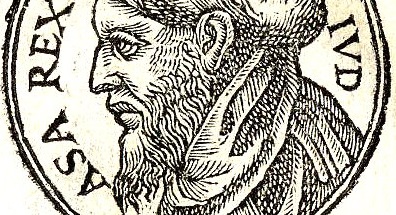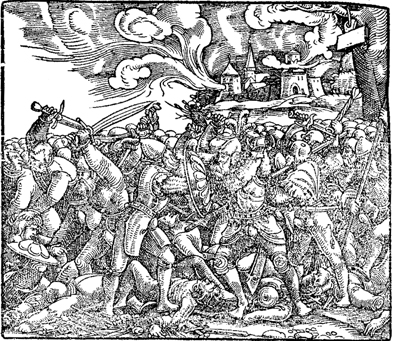
910 BC to 890 BC, Psalm 2: The Agitation of Nations
This site was first built in French (see www.147thgeneration.net). The English translation was mainly done using « google translation ». We have tried to correct the result of this translation to avoid interpretation errors. However, it is likely that there are unsatisfactory translations, do not hesitate to communicate them to us for correction.
(for that click on this paragraph)
Summary
This generation is from the years 910 BC to 890 BC
According to our count, this generation is the 2nd generation associated with Psalm 2. It is in this Psalm 2 that we therefore find an illustration of the facts of this generation.
King Asa succeeds Abiam over the kingdom of Judah. His reign was forty-one years. For the present generation, the period that interests us are the first twenty years of his reign. His reign, from a religious point of view, marks a break with the idolatrous mistakes of his predecessors (Solomon, Rehoboam and Abiam).
He is rewarded by God for this new fidelity. Especially when the Ethiopian Zerah threatens the kingdom of Judah with an army of a million, he turns to God. The LORD caused the Ethiopians to succumb before Asa and Judah, and they had to flee.
On the side of the kingdom of Israel, in this generation, Nadab succeeds Jeroboam for a short reign of two years. He is in fact assassinated by Baasa who becomes king exterminates all the family of Jeroboam.
Talk
Asa
The second generation is that of King Asa who succeeds Abiam over the kingdom of Judah. During the assessment of his predecessor King Abiam, we could read the following:
- And [1] he (Abiam) went in all the sins of his father (Roboam) that he had done before him, and his heart was not complete with the Lord, his God, as was the heart of David (the editor of the psalms) his father.
- For because of David, the Lord his God gave him rule in Jerusalem to set up his son after him to preserve Jerusalem.
- Since David did what was just in the eyes of the Lord and he did not turn away from all that the Lord had commanded him, all the days of his life, except in the matter of Uriah the Hittite.
Asa is the king who erased Solomon’s lack of idolatry, which had lasted for two generations (in the sense of ancestry), those of Roboam and Abiam. Asa’s results sheet is more positive than that of its predecessors:
- And Asa [2] did what was just in the eyes of the Lord, as had done David his father.
- And he abolished the adulterers from the land, and he removed the idols that his fathers had made.
- And also Maachah his mother he removed from [being] queen, for she had made a frightful image for an Asheira and Asa cut off her image and burnt it in Kidron Valley.
- The high places he did not remove, but Asa’s heart was complete with the Lord all of his days.
Zerah the Ethiopian
Asa’s reign was forty-one years old.
For the present psalm, the period we are interested in is the first twenty years of his reign. Those corresponding to the second generation of the night. For this first half of the reign we can refer to the Chronicles, especially as regards the battle he fought against Zerah the Ethiopian:
- And Asa [3] had an army bearing shields and spears, from Judah three hundred thousand and from Benjamin bearing shields and drawing the bow, two hundred eighty thousand, all these mighty warriors.
- And Zerah the Cushite came out against them with an army of a thousand thousand, and three hundred chariots, and he came as far as Mareshah.
- And Asa came out before him, and they set the battle in array in the valley of Zephath at Mareshah.
- And Asa called out to the Lord his God, and he said, « O Lord, there is no difference to You to help either the great or the powerless; help us, O Lord our God, for we have relied on You, and we have come with Your name upon this multitude. You are the Lord our God; let no man rule against You.
- And the Lord smote the Cushites before Asa and before Judah, and the Cushites fled.
This episode is also narrated by Tabari, we have already postponed it. Let us simply recall that Tabari recalls the providential character of this victory solely due to the faith of Asa in the Eternal and the intensity of his prayer. The annihilation of the army of Zerah being obtained only with twelve men of the army of Asa.
These first twenty years of Asa’s reign illustrate the second Psalm.

- Why have nations gathered and [why do] kingdoms think vain things?
- Kings of a land stand up, and nobles take counsel together against the Lord and against His anointed?
Asa is the anointed of the Lord and Zerah wants to overthrow him.
However the efforts of the nations are vain when they try to gang up against the LORD and his anointed, the people of Israel.
At least when the latter is faithful to his God as was Asa in the first part of his reign. So whatever the power of Israel’s enemies, the LORD scoffs at them and shall shatter them like a potter’s vessel. For in this case the people of Israel deserve their place on the holy mountain of the Lord, their sovereignty is established on Jerusalem. This is indicated by the following of the psalm of this generation:

- « Let us break their bands and cast off their cords from us. »
- He Who dwells in Heaven laughs; the Lord mocks them.
- Then He speaks to them in His wrath; and He frightens them with His sore displeasure.
- « But I have enthroned My king on Zion, My holy mount. »
- I will tell of the decree; The Lord said to me, « You are My son; this day have I begotten you.
- Request of Me, and I will make nations your inheritance, and the ends of the earth your possession.
- You shall break them with an iron rod; like a potter’s vessel you shall shatter them. »
David who is the author of the Psalms can be proud of the behavior of Asa who is the worthy heir of his grandfather.
He is the son to be honored. The son who has the protection of the Lord, the one whose nations are to pay homage. Whoever can claim the inheritance of David, the domain which the LORD hath set for him in Jerusalem, for as David did what was right in the sight of the LORD. What was not the case of these two predecessors: Roboam and Abiam. At least this is true for the first part of Asa’s reign.
End of the Jeroboam dynasty
During this second generation we witness the end of the reign of Jeroboam king of Israel:
- Nadab [5], the son of Jeroboam, reigned over Israel during the second year of Asa, king of Judah, and ruled over Israel two years.
- He did what was bad in the eyes of the Lord, and he went in the way of his father and in his sin that he had caused Israel to sin.
- And Baasha the son of Ahijah, of the house of Issachar, conspired against him, and Baasha struck him at Gibbethon, which belonged to the Philistines, when Nadab and all Israel were laying seige to Gibbethon.
- And Basha slew him in the third year of Asa the king of Judah and ruled in his stead.
- And it was as soon as he was king, he slew all the house of Jeroboam; he did not leave over any person belonging to Jeroboam, until he destroyed it, according to the word of the Lord through his servant, Ahijah the Shilonite.
- For the sins of Jeroboam which he had sinned and caused Israel to sin because of his angering which he angered the Lord, the God of Israel.
This end of Jeroboam is in accordance with Ahiyya’s prophecy.
Jeroboam had instituted an idolatrous worship and thus lead to divine wrath. The latter naturally worried when his son fell ill and asked his wife to consult the prophet Ahiyya (the same one [6] who had earlier told him about his coming reign), the following prophecy was announced to him:
- And it [7] was as Ahijah heard the sound of her footsteps into the doorway, that he said, « Come in, Jeroboam’s wife. Why are you disguised ( – On the advice of Jeroboam, it was disguised so that the prophet does not recognize it – ) ? I am sent to you to tell you harsh tidings.
- Go say to Jeroboam, So has the Lord the God of Israel said, ‘Since I raised you from amidst the people and I made you the ruler over my people Israel.
- And I tore the kingdom from the House of David and I gave it to you. But you have not been like My servant David, who heeded My commandments and who followed Me with all his heart to do only what was proper in My eyes.
- And you have done worse than all that were before you and you have gone and made for yourself foreign gods and molten images to anger Me, and you have cast Me behind your back.
- Therefore, I shall bring disaster on the house of Jeroboam, and I will cut off from Jeroboam every male child and those who are restrained and those who are free in Israel, and I will expunge after the house of Jeroboam as one expunges dung, until it is completed.
- The dead of Jeroboam in the city the dogs shall eat, and the dead in the field, the birds of the heaven shall eat, because the Lord has spoken.
The opposing behavior of Rehoboam and Jeroboam to this generation, bringing to one the divine benevolence and the other his anger, is a good illustration of the conclusions of the psalm of this generation:

- And now, [you] kings, be wise; be admonished, [you] judges of the earth.
- Serve the Lord with fear, and rejoice with quaking.
- Arm yourselves with purity lest He become angry and you perish in the way, for in a moment His wrath will be kindled; the praises of all who take refuge in Him.

[1] Melachim I – I Kings – Chapter 15, verses 3 to 5
[2] Melachim I – I Kings – Chapter 15, verses 11 to 14
[3] Divrei Hayamim II – II Chronicles – Chapter 14, verses 7 to 11
[4] See: Divrei Hayamim II – II Chronicles – Chapter 15, verse 10 (who quotes a fact after this battle in the fifteenth year of Asa’s reign.
[5] Melachim I – I Kings – Chapter 15, verses 25 to 30
[6] See: Melachim I – I Kings – Chapter 11, verses 29 and following.
[7] Melachim I – I Kings – Chapter 14, verses 6 to 11.

